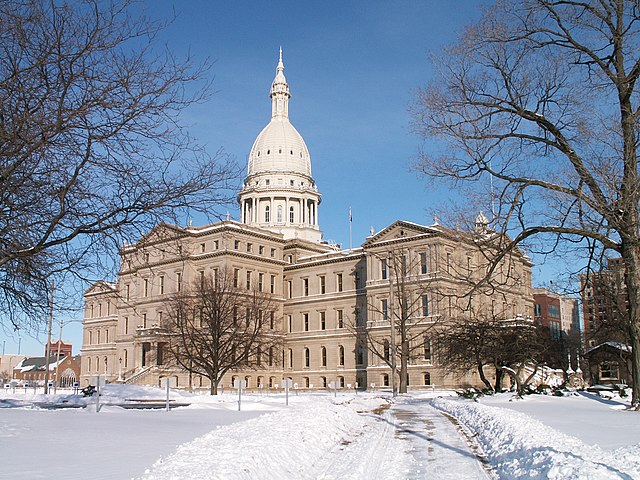The Michigan Supreme Court ruled that the state legislature cannot adopt-and-amend indirect initiated state statutes, and that such actions in 2018 violated the Michigan Constitution.
An indirect initiated state statute is a citizen-initiated ballot measure that amends state statute. While a direct initiative is placed on the ballot once supporters file the required number of valid signatures, an indirect initiative is first presented to the state legislature. Legislators have a certain number of days, depending on the state, to adopt the initiative into law. Should legislators take no action or reject the initiative, the initiative is put on the ballot for voters to decide.
In 2018, a sufficient number of signatures were filed for two indirect initiatives in Michigan, the Minimum Wage Increase Initiative and the Paid Sick Leave Initiative. Legislators had 40 days to approve the initiatives, have them proceed to the ballot for voters to decide, or offer competing ballot measures to appear alongside the initiatives. On Sept. 5, the Michigan State Legislature approved both.
Legislation to amend the initiatives was introduced on Nov. 8, 2018. Legislative Democrats voted against the amendments, while most Republicans voted for them. In Nov. 2018, Michigan was a Republican trifecta, and Gov. Rick Snyder (R) signed the bills. Heading into Jan. 2019, Michigan became a divided government due to the election of Gov. Gretchen Whitmer (D).
Michigan One Fair Wage and Michigan Time to Care—the campaigns behind the two initiatives—sued the state of Michigan. Plaintiffs described the legislative amendments as an adopt-and-amend tactic that violated Section 9 of Article 2 of the Michigan Constitution, which concerns the power of citizens to initiate laws. Defendants argued that nothing prohibited the legislature from amending enacted indirect initiatives.
In 2022, the Court of Claims ruled against the state, holding that the legislature’s amendments to the enacted initiatives were unconstitutional. In 2023, the Court of Appeals reversed the claims court’s decision, ruling that there is no “temporal limit on when the Legislature could amend initiated laws enacted by the Legislature.” Attorney General Dana Nessel (D), as well as the campaigns behind the two affected initiatives, appealed the ruling to the Michigan Supreme Court, which agreed to hear the case. On December 7, 2023, the Michigan Supreme Court heard arguments.
On July 31, 2024, the Michigan Supreme Court ruled 4-3 that legislators adopting a citizen-initiated statute, and then amending the initiative during the same legislative session, violated the Michigan Constitution. The decision was along partisan lines, with the court’s four Democrats ruling against adopt-and-amend. The court’s three Republicans dissented.
Justice Elizabeth Welch (D) wrote the court’s opinion, which said, “[W]e hold that Article 2, § 9 provides the Legislature with three—and only three—options upon receiving a valid initiative petition. Any legislative response to a valid initiative petition that falls outside those three discrete options is unconstitutional and impermissibly infringes upon the people’s reserved power.” The three options are: (1) enact the law “without change or amendment” within 40 days; (2) “reject the proposed law, in which case the proposed law will appear on the ballot;” or (3) propose a competing measure to appear on the ballot alongside the initiative.
Justice Elizabeth Clement (R), in her dissent, wrote, “There is certainly reason to be frustrated by the Legislature’s actions here… But nothing in Article 2, § 9 restricts the Legislature from doing so. And as tempting as it might be to step into the breach, this Court lacks the power to create restrictions out of whole cloth.”
As the legislature’s actions were ruled unconstitutional, the court ordered that the ballot initiatives go into effect on Feb. 21, 2025, with an amended gradual increase for the minimum wage initiative through 2028.
The Minimum Wage Increase Initiative will increase the state’s minimum wage to $12 per hour, plus an adjustment for inflation, and phase out the minimum wage for tipped employees, which is less than the general minimum wage. The measure also requires overtime compensation of 150% for employees who work an excess of 40 hours during a workweek. Currently, Michigan’s minimum wage is $10.33 per hour.
The Paid Sick Leave Initiative will require employers to provide employees with paid sick time. Employees of small businesses, defined as employers with fewer than 10 employees, will accrue at least 40 hours of paid sick time per year. Employees of businesses with 10 or more employees will accrue at least 72 hours of paid sick time per year.
Additional reading:


